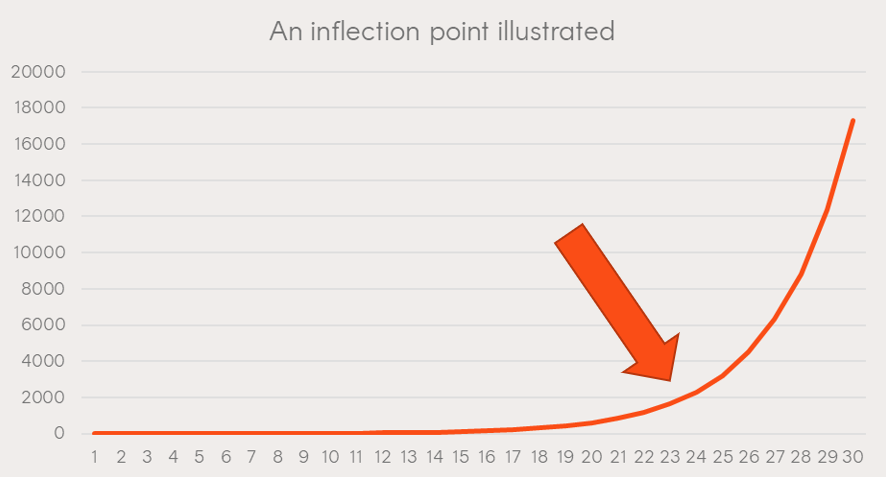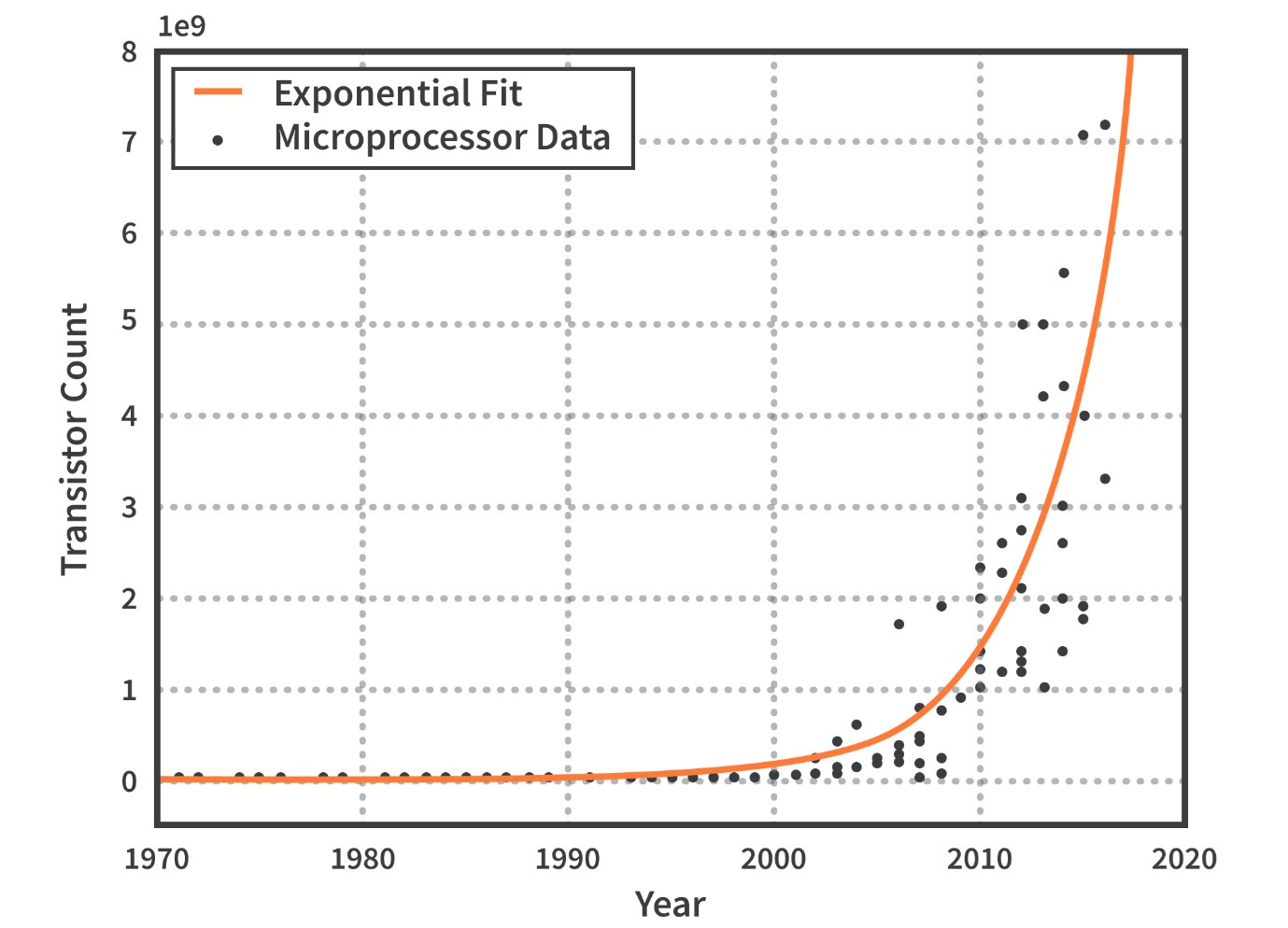6 minutes reading time
Artificial intelligence (AI) has been all over the news and social media in the last few months. From the release of ChatGPT, to the Hollywood writer’s strike – writers are concerned about losing work to AI – and the huge increase in demand for graphics processing units (GPUs) used to power AI supercomputers. The developments in AI and the effects they could have on the world are right at the front of many people’s minds.
But what does all this mean for investors? How can they gain exposure? And just what is an inflection point anyway?
Inflection points and why they matter
The term ‘inflection point’ is taken from mathematics, where it means the point in a curve where a change of direction occurs. In business, it usually refers to a period where exponential growth appears to ‘take off’.
The chart below illustrates what an inflection point looks like.

Source: Betashares. Chart is illustrative and does not represent any business or asset.
Humans tend to think in linear terms – i.e. 1, 2, 3, 4, 5. But in the real world, there are many examples where things grow in exponential terms – i.e. 1, 2, 4, 8, 16. During the early stages of exponential growth, it can appear linear, or even slower than linear. As growth compounds over time though, the changes from one point to the next get larger and larger in absolute terms. Compound interest is a well-known example of exponential growth.
Another real-world example of exponential growth is Moore’s Law. This refers to a prediction made in 1975 by computer scientist Gordon Moore, that the number of transistors on a microchip would double every two years1. This prediction held remarkably true for several decades, as shown in the chart below.

Source:CircuitBread.
The latest on AI
While ChatGPT has drawn much of the attention so far this year, it’s far from the only major change happening in the world of AI.
GPU maker Nvidia reported its earnings for the first quarter of FY24 in May, with revenue jumping 19% on the previous quarter, to US$7.19 billion. It also provided earnings guidance for the second quarter of US$11 billion, which if achieved, would be a 53% increase on Q1, and a 64% increase on the same period last year. According to Colette Kress, Executive Vice President and Chief Financial Officer at Nvidia:
“Generative AI is driving exponential growth in compute requirements and a fast transition to NVIDIA accelerated computing, which is the most versatile, most energy-efficient, and the lowest TCO (total cost of ownership) approach to train and deploy AI. Generative AI drove significant upside in demand for our products, creating opportunities and broad-based global growth across our markets.”2
Amazon Web Services (AWS) recently launched an AI application called CodeWhisperer, which helps programmers write code, as well as Bedrock, a service that helps customers build enterprise scale AI applications. Amazon CEO, Andy Jassy said: “We like the fundamentals we’re seeing in AWS, and believe there’s much growth ahead.”3
Online learnings platform Chegg recently announced CheggMate. CheggMate is a virtual-tutor powered by GPT-4, and helps students through personalised lessons.
“We believe AI has the potential to provide tailored learning experiences to everyone and improve the way people around the world learn,” said Sam Altman, CEO of OpenAI (the creator of ChatGPT).4
This is just a small sample of the developments that have occurred in recent months, as a full rundown would require an article of its own.
How AI could enhance our lives
AI is not just numbers and hardware – there are already many real-world applications today, and many more on the horizon.
Transport
The dream of ordering a fully autonomous robotaxi might not be a reality just yet, but the technology is developing at a rapid pace. Bill Gates recently commented that the day that we can hand control of our cars to a machine “is coming sooner rather than later”, adding that he expects we’ll reach a “tipping point” within the next decade. Gates is not shy about the impact this will have on the world, saying that autonomous vehicles “will change transportation as dramatically as the PC changed office work.”5 He should know, given his role in popularising the PC!
Virtual assistants and workplace efficiency
While fully autonomous cars might still be some way off, AI-powered virtual assistants are already here. In fact, as I’m writing this, Microsoft Word is offering predictions for what words may come next, making my typing more efficient. Microsoft launched its new AI-powered Copilot in March. Powered by GPT-4, the next iteration of OpenAI’s ChatGPT generative AI model, Copilot integrates with existing Microsoft products, allowing users to work more efficiently and effectively. The individual features of Copilot are too numerous to list here, but you can read more on the Microsoft blog.
Healthcare technology
AI is beginning to transform the healthcare industry across multiple areas, from assisting doctors in diagnosing and treating patients, to identifying cancers in medical images, and even speeding up drug development. In several applications, AI can already outperform experienced specialists.6
Software programming
Language models such as ChatGPT aren’t just good at generating written English, they can also be used for programming language. OpenAI worked with GitHub, a popular site where programmers create and share code, to produce GitHub Copilot, which is specifically designed to help programmers write code.
Cybersecurity
For cybersecurity, AI represents both a threat and an opportunity. As we explored in a previous article, AI models could be used by nefarious actors to create software and scams that threaten online safety. However, machine learning can also be used to create systems that can recognise patterns, providing faster threat detection and potentially identifying multiple threats in real-time.7
Ways to gain exposure
RBTZ Global Robotics and Artificial Intelligence ETF – Around 70% of the companies in Betashares Global Robotics and Artificial Intelligence ETF (ASX: RBTZ) (as at 31 May 2023) are directly or indirectly involved in the development or leveraging of AI technology. AI ‘pure play’ companies make up ~33% of the portfolio, including names like C3.AI, Uipath, and Nvidia – which RBTZ has held since the fund’s inception in 2018.
NDQ Nasdaq 100 ETF – The Nasdaq-100’s top six holdings Microsoft, Apple, Nvidia, Amazon, Meta, and Alphabet account for 40% of the index weight (as at 2 June 2023) with the added benefit of diversification among other leading technology companies benefitting from AI like Tesla for automatic driving and chip maker Broadcom. Betashares NASDAQ 100 ETF (ASX: NDQ) provides you with exposure to this entire index in a single trade on the ASX.
There are risks associated with an investment in RBTZ or NDQ, including market risk, sector risk, country risk and currency risk, as well as robotics & artificial intelligence companies risk and smaller companies risk for RBTZ. Investment value can go up and down. An investment in each Fund should only be considered as a part of a broader portfolio, taking into account your particular circumstances, including your tolerance for risk. For more information on risks and other features of the Fund, please see the Product Disclosure Statement and Target Market Determination, both available at www.betashares.com.au.
References:
1. What is the significance of Moore’s Law and is it still true today?
2. Nvidia Q1 FY24 Earnings Call and Financial Reports
3. Amazon Q1 2023 Results
4. Chegg press release, Chegg announces CheggMate, the new AI companion, built with GPT-4
5.The rules of the road are about to change.
6.Top Artificial Intelligence Companies In Healthcare To Keep An Eye On
7.The Impact of AI on Cybersecurity: Predictions for the Future

2 comments on this
A good read and forthright thinking for unlimited scope development
Given the recent surge in discussions and media coverage surrounding artificial intelligence (AI), including the release of ChatGPT and concerns among writers about potential job displacement, what key developments in AI have captured public attention? How are writers responding to the perceived threat of losing work to AI, and what broader effects on the world are people currently contemplating in relation to advancements in artificial intelligence, particularly with the increased demand for graphics processing units (GPUs) powering AI supercomputers?
Visit us telkom university